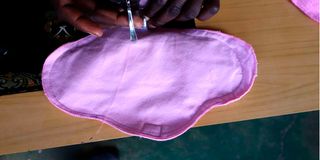Damp pads, itchy discomfort: A slum girl's menstrual struggles in rainy season

A reusable pad made by a women's group in Narok County. For girls like Aaliyah in Mathare's informal settlements, the simple act of managing their periods becomes a dangerous gamble during the rainy months.
What you need to know:
- Aaliyah, a teenager from Mathare slum, was thrilled to receive reusable cloth pads but the rainy season made it difficult to dry them properly.
- She has no choice but to use the damp pads, risking infections.
- While more affluent women could easily dry their reusable pads, girls like Aaliyah from low-income households face the dilemma of using damp pads or going without.
Aaliyah*, a teenager born and raised in Mathare slum, Nairobi City County, was thrilled to receive three reusable cloth pads in February of this year. This came after she joined a vocational centre run by a charitable organisation within the slum.
At just 16 years, Aaliyah fell prey to an older man's false promises last year. He impregnated her, luring her with the prospect of providing for her needs, including money to purchase sanitary towels, in exchange for sexual favours.
The reusable cloth pads offered Aaliyah a newfound sense of dignity and autonomy, breaking the cycle of exploitation she had endured.
Aaliyah is among six siblings raised by her single mother who does unreliable jobs earning her as little as Sh50 at every chance.
“I was happy because I knew one of my problems had been eliminated (access to pads),” says Aaliyah who enrolled for a six-month cosmetology course at the centre, free of charge.
“I have a child now and whatever I get goes into buying my daughter something she needs. My mom is already overwhelmed. I can't expect her to support me, or ask her for money to buy pads,” she says.
Before she got the reusable pads, most of the times, she would use pieces of old clothes to manage her menses. The recent heavy rains, however, challenged how she used the reusable pads.
“During sunny days, if you wash the cloth pad at 8am, it's dry and ready to wear by 2pm. But when it rains, it takes two days or more, and it doesn't dry well. And I usually wear one during the day and another one during the night,” she says.
“We have a charcoal iron box, so I’d put it in between clothes and press it to remove the water before I wear it.”
During the time she used the damp pad, she says her private part was itchy and sometimes she was tempted to remove it, but owing to fear of soiling herself, she’d use another piece of cloth to scratch herself.
Meanwhile in Utawala, a middle-income suburb in Nairobi City County, Esther Ngare, a communication strategist loves using the reusable sanitary towels.
“A friend introduced me to the reusable pads some time last year. She is a journalist. She visited a centre where they make the cloth pads and bought me a pack,” she says.
“They are very comfortable. The part that comes into contact with your body has a cotton feel and you don't feel itchy like when you use the synthetic pads. I even stopped using the synthetic panty liners. The cloth pads serve me as pads and panty liners, and I’m happy with my shift. I’d vouch for them any time.”
Having loved them, Esther bought six more packs at Sh650 each. One pack contains three pieces.
“I change pads at least four times during the day and twice at night. I have enough, so even if they take four days to dry, I have no problem. The only challenge is that they don't dry very well when it’s the wet season. So, I usually hang them near a heater to dry and warm them,” she says.
While use of reusable pads removes the barrier of access to the menstrual hygiene product, the rainy season brings the risk of health problems for the women and girls from the low-income households like Aaliyah.
Adequate supply
According to Dr Maureen Owiti, an obstetrician gynaecologist, one can have a fungal infection from using damp cloth pads.
A 2022 study on Intimate hygiene practices and reproductive tract infections: A systematic review, which looked into the exposure to urogenital infections by use of cloth pads established that drying reusable pads inside the house and storing them inside the toilet resulted in higher candida infection prevalence.
But for women and girls like Aaliyah who don't have the luxury of adequate supply, an infection is a burden they can't easily avoid.
“I’d rather have the damp pad on me than go without. Better that way than walking in fear of blood dribbling down your legs,” says Aaliyah.





